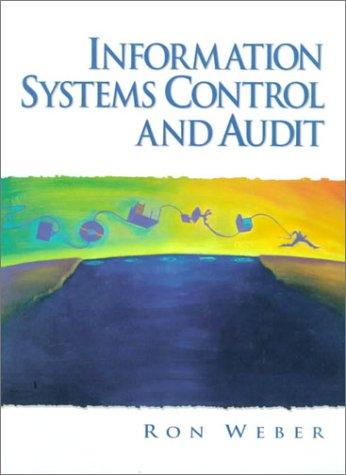You are the manager of internal auditor for Kukup Manufacturing Ltd., which is a large, diversified manufacturing
Question:
You are the manager of internal auditor for Kukup Manufacturing Ltd., which is a large, diversified manufacturing company based in Kuala Lumpur, Malayasia. Kukup has well-established computer systems to support its operations. The internal audit group that you manage, however, was established only two years ago. Although you have two staff members who are well trained, they still lack experience in internal audit.
One day you are called to a meeting with the general manager of Kukup. He informs you that Kukup has been asked to participate in a small consortium of companies to implement an EDI system. The consortium includes companies that are major suppliers to and customers of one another. The EDI system has been proposed by the general manager of another company that is one of Kukup's competitors. Nonetheless, his company also purchases component parts for some of its own products from Kukup, so it is also one of Kukup's customers.
The objectives for the EDI system are ambitious, but nevertheless they are also fairly standard. Paper documentation associated with sales and purchases is to be eliminated and replaced by electronic exchanges of information. Sales and purchases can also be generated automatically in the system. For example, a few of the companies use advanced material requirements planning systems whereby the suppliers of component parts and raw materials are responsible for providing sufficient quantities on time to allow the companies to meet their production requirements. Also, automatic generation of purchase orders for component parts and raw materials is a common feature of many of the inventory systems used by the companies in the consortium.
One of the advanced features that is being considered for the proposed EDI system is relatively open access to the databases of all of the companies in the consortium. The idea is to improve production effectiveness and efficiency among members of the consortium to gain an advantage over competitors. For example, a purchaser will be able to access the production databases of alternative suppliers to determine which supplier is likely to be able to provide the components or raw materials they need on a more timely and less costly basis. In this regard, a major motivation for establishing the consortium is a move by another group of companies to establish a similar EDI system among themselves. The EDI system that is being considered by the competitor consortium, however, will not allow sharing of databases among its members.
To develop, implement, operate, and maintain the hardware and software platforms that will be needed to support the EDI system, the general manager who has proposed the system is arguing that the consortium should use an outsourcing vendor. He has suggested using a large New Delhi-based outsourcing vendor that has had extensive experience with EDI systems. He contends that none of the companies in the consortium have sufficient expertise to be able to develop the system. Moreover, because the proposed system includes functions to permit common access to databases, it would be better to have someone independent develop the software to reduce the likelihood of irregularities occurring.
During the meeting with your general manager, he expresses concerns about various exposures associated with your company joining the consortium and implementing the proposed EDI system. He also wonders about controls that might be used to reduce losses from these exposures. In particular, he has recently attended a course on management control where one of the presenters gave a brief introduction to concurrent auditing techniques. He wonders whether your company might not try to implement concurrent auditing techniques to mitigate losses from errors or irregularities if it were to participate in the proposed EDI system. He asks you to advise him on this issue so he can better determine whether your company should support the development of the EDI system.
Required: Write a brief report for the general manager advising him on whether concurrent auditing techniques might be usefully employed in the proposed EDI system. If you believe they would be useful, briefly outline any important issues you feel would need to be addressed in the planning stages in relation to the development, implementation, operation, and maintenance of concurrent auditing techniques in the proposed EDI system.
Step by Step Answer:






